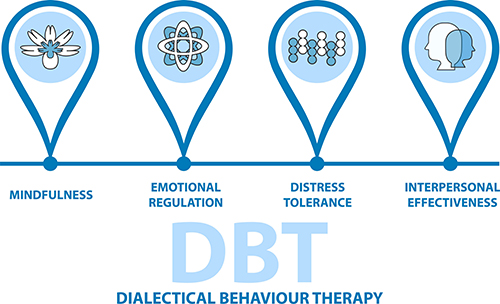It is a fact that most practitioners will tell you that their form of therapy is the best form of therapy. At Intelitalk Mind, Body and Wellness, our practitioners are versed in eclectic forms of therapy. However, we pride ourselves in some of the following aspects. We do not sit in a room with a client and simply nod our heads and stare. Our expectation for ourselves is to actively engage you in conversation and critical thinking. Therapeutic talking is absolutely important and can often be an important aspect of mental health support. We believe that actionable steps matter most though. It isn’t enough to just talk about it, now let’s do something about it.
A comprehensive treatment plan from the outset will be developed for you in therapy. Your provider will explain their role in your treatment and what the focus of the treatment will be at the onset. The goal will be to help you unlock what is blocking you from being the best you. Every patient requires a customized approach to give them the best results. We employ a number of therapy options so you get what you need.
INTELITALK…Mind, Body and Wellness Independent Practitioners utilize research based therapeutic approaches that include but are not limited to:
Cognitive Behavioral Therapy
Cognitive-behavioral therapy (CBT) is one of the most sought out forms of therapy today. How come? It helps a person to challenge automatic thinking by restructuring negative thoughts about your life, circumstance and situations. The expectation is to use this knowledge to create new and healthier thoughts which in turn will help to change the behavior through actionable steps. Are you ready for a little homework? Therapy doesn’t stop when you walk out of your in person or virtual session. How you utilize what you have learned at home will help support your growth. This may be through daily or weekly assignments, taking data on yourself, or other novel assignments.

Family Therapy

Family therapy is meant to work on interpersonal communication for family members. It supports growth in conflict resolution and a myriad of ways to foster each person having a voice, including the children. Learning each individual's communication style and how to express yourself and interpret someone else’s words is paramount in fostering a healthy and communicative relationship. Family therapy can be short in nature. However, ultimately its timeliness is predicated on the active involvement of each member for change. Sometimes that can be quick and sometimes that can take longer due to being stuck in patterns of negative thought process. Our goal is to help each member break that barrier.
Marriage Counseling
Marriage counseling/therapy is often an offshoot to family therapy. In marriage therapy, couples will learn how to identify their “love language”, triggers to unhealthy communication and how to create a relationship through focusing on intimacy, trustworthiness and openness. These three areas are key to fostering a healthy relationship. Many complaints of marriage counseling is that the therapist is “taking sides”. We can assure you that the only side we are taking is the side of what brings you closer together in how you communicate with one another. You will typically leave sessions with assignments on how to communicate with one another. This can be uncomfortable if you’re not used to

communicating or harboring negative emotions. However, one should ask themself, if I don’t want to make the change or at the very least engage in the process then why try therapy to begin with. There is no judgment here.

EMDR

Eye Movement Desensitization and Reprocessing (EMDR) is a form of therapy that is designed to alleviate the distress associated with traumatic memories. The therapy incorporates the use of eye movements and other forms of rhythmic stimulation (such as tones or taps).
EMDR therapy typically follows an eight-part process over 12 weeks or so. The eight stages the therapist would cover during this time frame are:
While the patient briefly focuses on the trauma memory and simultaneously experiences bilateral stimulation (BLS), the vividness and emotion of the traumatic memory are reduced. EMDR is often used to treat post-traumatic stress disorder. We are completely booked for our EMDR sessions at the moment. However, if interested in EMDR specifically, please make sure to let us know to add you to our waiting list. The second it opens, we will prioritize those on the waiting list.
Comprehensive Psychoeducational Evaluations
We provide IQ testing and Achievement testing to help support college and graduate school accommodations. We do not take insurance for these evaluations. Additionally, we will help with the paperwork needed to apply for these accommodations for college and for graduate school examinations. We have an excellent rate of success in acquiring those accomodations when appropriate.

Rational Emotive Behavioral Therapy

Rational emotive behavior therapy (REBT) is a type of cognitive behavioral therapy (CBT) that aims to help a person challenge unhelpful thoughts to avoid negative emotions or behaviors. This type of therapy, started by Albert Ellis in 1955 was connected to Cognitive Behavioral Therapy with action orientation. It focuses on the present and helps the client to look at events in their lives through a different lens. By practicing this approach it can prevent maladaptive behaviors and stop emotions that are negative in nature. The client is engaged at looking at their automatic thoughts that are irrational in nature and finding ways to accept less polarizing views.
Mindfulness Therapy
Mindfulness is a conscious awareness of the present moment. We see it added into other forms of therapy, such as Cognitive-based Therapy (CBT), Dialectical Behavior Therapy (DBT), or Acceptance and Commitment Therapy (ACT). People often misunderstand mindfulness as relaxation or mediation alone. Our focus with clients is bring to the surface the awareness of the thoughts, feelings, and actions that hinder movement forward. This can be very difficult to do when focusing on the past or the future. Our goal is to teach you exercises to bring you into the present.

LGBTQ+ Support

Thankfully, the world is starting to understand and accept the needs and the rights of the LGBTQ+ community. However, it continues to be a struggle, especially for those coming to grips with understanding who they are or who they have always been. We support the community in helping each client to understand their own emotional connections, acceptance and how to navigate familial dynamics and friendships.
Telehealth
Sometimes it is simply difficult to leave home. Especially if you have children or responsibilities that keep you in the house. A key factor in providing services to patients across the country has been the flexibilities extended by both public and private payers. Many of these flexibilities in service delivery flow from the PHE declaration, which was issued on January 27, 2020, and has been renewed every 90 days since. Prior to the PHE, patient were often required to be in a clinical setting, such as an office, skilled nursing facility, or clinic. Now, many states have removed this restriction,, which allows patients to receive care wherever they are, s

uch as at home, work, or school. The PHE also gives providers substantial flexibility in the technology they use to deliver telehealth services. Providers currently have temporary flexibility to provide their services via non-public facing platforms like FaceTime, Zoom, and WhatsApp. These popular platforms are not Health Insurance Portability and Accountability Act (HIPAA) compliant, so providers faced penalties for using them to provide telehealth prior to the PHE. However, INTELITALK MBW ONLY USES HIPAA COMPLIANT FORMATS.

Drug Counseling

According to the National Survey on Drug Use and Health, about 15 percent of Americans 18 or older needed treatment for substance abuse (now more appropriately called "substance use disorder") in 2020. The same report found that less than 10 percent of people who needed treatment for substance use disorder received it. The need for well-trained counselors who can diagnose, assess and treat addiction is greater than ever—for those who have never received treatment and for the millions of people who benefit from counseling services every day. We have that here at Intelitalk. We take a more individualized approach
that feels less clinical based and help you develop usable skills to address accountability while also helping you to set up support networks outside. Additionally, we work at uncovering how this happened and how to avoid the pitfalls again.

Dialectical Behavioral Therapy
Dialectical behavior therapy (DBT) is a modified type of cognitive behavioral therapy (CBT). It teaches people how to live in the moment, develop strategies to deal with stress, regulate, improve their relationships with others and of course regulate emotions. DBT 's success has been mostly noted with treating patients with borderline personality disorder (BPD), but it has been adapted to treat other mental health conditions as well. It can help people who have difficulty with emotional regulation or are exhibiting self-destructive behaviors (such as eating disorders and substance use disorders). This type of therapy is also

sometimes used to treat post-traumatic stress disorder (PTSD). Teaching mindfulness practices and distress tolerance are key components to DBT. Currently, it should be noted that no FDA approved medication exists for Borderline Personality Disorder. This is very important to the rationale as to why therapy is paramount in these client's lives.

Social Skills Training and Groups

Social skills groups may be used to teach a variety of social behaviors. In the evidence base, social skills group training targeted perspective-taking, conversation skills, friendship skills, problem-solving, social competence, emotion recognition, theory of mind, and problem-solving. In addition, specific interaction skills such as initiation, responding, maintaining, greeting, giving/accepting compliments, turn taking, sharing, asking for help, offering help, and including others were also improved through the use of social skills groups. Social skills can be taught individually or in a group
setting. There are positives and negatives to both modalities. We will work together to see which is the appropriate setting for your child and what type of group may be available for your child if appropriate.

